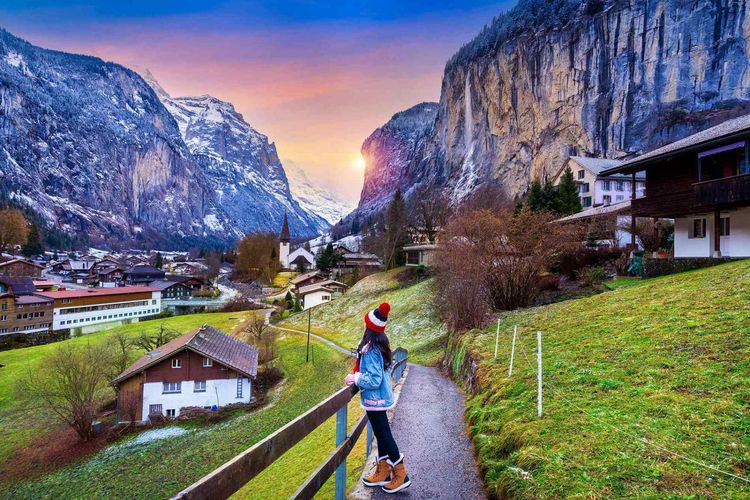Switzerland, known for its understated luxury, is increasingly targeting wealthy tourists with its growing five-star hotel offerings. As the number of billionaires rises globally, the affluent are seeking the ultimate luxury experiences. In Switzerland, this trend has led to an influx of lavish amenities and services, including luxury spas, gourmet restaurants, and ski butlers. While this strategy boosts the economy, it raises concerns about its impact on local communities and the risk of alienating non-billionaire tourists. The country is betting on higher spending from fewer, wealthier visitors to secure its position as a top luxury destination.
Switzerland’s Luxury Appeal
Despite the global economic challenges, the world’s rich are prospering, and luxury tourism is booming. In Switzerland, the five-star hotel industry is growing faster than any other segment, with hotels now renovated to meet the highest standards. These include opulent spas, panoramic suites, and exceptional service, with ski butlers who offer personalized assistance. The key markets are the United States, Gulf states, China, and Southeast Asia. American guests expect 24-hour room service, while Swiss hotels are eagerly catering to wealthy tourists from emerging markets in China and India.
For Switzerland’s tourism sector, catering to the rich isn’t just a luxury; it’s an economic strategy. According to Markus Berger of Switzerland Tourism, while only 8% of tourists stay in five-star accommodations, they contribute to 25% of the nation’s total tourism revenue. This significant contribution justifies the focus on high-end guests, despite the country’s higher living costs, particularly with the strong Swiss franc making it harder to compete on price.
Quality Over Quantity: The Swiss Tourism Philosophy
Switzerland has never competed on price, and it doesn’t plan to. With neighboring countries offering cheaper alternatives, Switzerland has opted for a strategy based on quality, service, and added value. The luxury market helps stimulate the wider economy, with tourists spending generously in Michelin-starred restaurants, luxury boutiques, and other high-end amenities.
However, this focus on the ultra-wealthy isn’t without its challenges. In luxury hotspots like St. Moritz and Zermatt, locals are concerned that the influx of high-end tourists is pushing up living costs. One of the most significant challenges is providing affordable accommodation for hotel staff. Many workers are forced to commute long distances, which raises questions about the sustainability of this model for local communities.
Monika Bandi, a tourism expert at Bern University, cautions that while luxury tourism can drive economic growth, there is a fine balance to maintain. “Switzerland must watch out for the tipping point, where the destination loses its character,” Bandi warns. While high-spending tourists may be beneficial, an over-reliance on them could alienate the local culture and reduce the authenticity that many visitors seek.
The Wengen Controversy: Is Luxury Diluting Local Charm?
Wengen, a picturesque Swiss resort famed for its Lauberhorn ski race, has recently become a focal point in the debate about the impact of luxury tourism. The town, traditionally known for its British skiers and quaint atmosphere, is preparing to open its first-ever five-star hotel, along with a complex of serviced luxury apartments. These high-end properties are aimed at wealthy tourists who wish to own or rent a luxurious holiday home in the Swiss Alps.
However, this development has sparked controversy. Critics, including Simon Weiss from the Swiss Heritage Society, argue that the project isn’t truly a hotel. Weiss claims that the complex is designed more like a holiday home development and could disrupt the local community’s character. Locals also express concerns that the influx of wealthy tourists might change the essence of the resort, which they believe should retain its modest charm.
Wengen’s tourism director, Rolf Wegmüller, counters these concerns, pointing out that the town’s inaccessibility by car means there won’t be an influx of luxury cars like Bentleys or Rolls-Royces. He believes that the introduction of luxury accommodations will not change the village’s character, as most guests prefer not to flaunt their wealth.
The Economic Necessity of Luxury Tourism
Despite local concerns, there are clear economic benefits to attracting high-end tourists. Many Swiss alpine villages, once poor, now rely heavily on tourism for their economic survival. Small dairy farms have closed due to changes in global trade rules, and tourism has stepped in as a critical revenue source, particularly for mountain communities.
Switzerland Tourism’s Berger emphasizes that while the five-star sector is growing, three-star hotels still dominate the market. He believes that offering a diverse range of accommodations ensures that the country remains accessible to both wealthy tourists and those with more modest budgets.
The Future of Swiss Luxury Tourism
The number of wealthy tourists visiting Switzerland is on the rise, and with it, the country’s focus on luxury tourism continues to expand. While the shift toward catering to affluent visitors may alienate some, it’s clear that luxury tourism plays a crucial role in Switzerland’s economy. The country’s strategy of not competing on price but focusing on quality seems to be working—at least for now.
However, as Swiss resorts like Wengen and St. Moritz evolve to meet the demands of the ultra-wealthy, the question remains: how long can Switzerland maintain this balance before its small alpine villages lose their original charm? For now, Switzerland is betting that wealthier, fewer visitors will continue to contribute significantly to its tourism revenue, but whether this model will work in the long term remains to be seen.
For more insights on Switzerland’s evolving tourism strategy, visit Issue N Fact.

